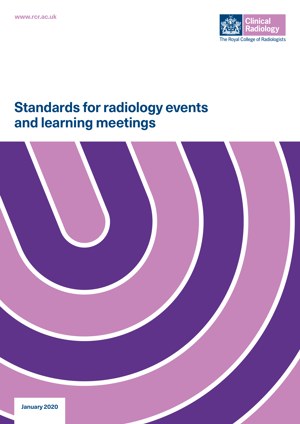Standards for radiology events and learning meetings
Date: 2020
Date of next review: 2024
This document emphasises the educational role of Radiology Events and Learning Meetings (REALMs) where radiological discrepancies are anonymously reviewed alongside examples of excellence. It is inevitable that, with hindsight, often combined with additional information, discrepancies or excellent spots will be acknowledged in the original interpretation of a study. Not all discrepancies should be seen as ‘errors’ and excellent diagnoses are equally as important in a learning environment.
It is worth noting that not all discrepancies are errors, nor will they require a duty of candour process to be undertaken. The RCR is currently working on guidance around the duty of candour and more advice on this topic will be published later this year.
This set of standards outlines the key areas that should be considered when setting up and running Radiology Events and Learning Meetings.
Standard 1.
Clinical engagement: All radiologists should attend a minimum of 50% of departmental radiology events and learning meetings (REALMs) and should contribute at least one case a year to their REALM.
Standard 2.
Organisation of meeting: A minimum of six REALMs per year should be held in and facilitated by each trust. These may involve the whole radiology department.
Standard 3.
The chair: The chair of REALM should be appointed and remunerated fairly by the trust and should be able to demonstrate duties performed and output. This should be recorded in the job plan as an ‘additional NHS responsibility’.
Standard 4.
The notifier: The radiologist who has detected a discrepancy or clinical incident (the notifier) has certain duties to record this which all radiologists have, and these should still be carried out regardless of whether or not the discrepancy or clinical incident is submitted to the REALM for anonymous discussion.
Standard 5.
The cases: The cases in a REALM should be anonymised and discussed for the purposes of education only. The REALMs should operate alongside but completely separately from candour, serious untoward incident (SUI), disciplinary or legal processes.
Standard 6.
The documentation: Standard emails should be sent to the radiologists involved in the submitted cases prior to discussion. Learning points from the cases discussed should be summarised and disseminated. Attendance and contribution should be recorded and distributed for appraisal.
Standard 7.
Feedback and reflection: Participating radiologists are encouraged to perform private reflection of the cases discussed. The chair is encouraged to identify patterns of errors and target teaching accordingly.
Standard 8.
The culture: The chair should ensure a culture of respectful sharing of knowledge with no blame or shame.
Standard 9.
Links with the RCR: The REALM chair of each trust should be identified to the RCR’s Radiology Events and Learning (REAL) Panel as a contact point for exchange of views and with the aim of establishing an inclusive national network of individuals with an interest in and experience of radiology events and learning. The chair of the REAL Panel should ensure submission of at least one case per year for consideration for publication in the REAL Newsletter.
